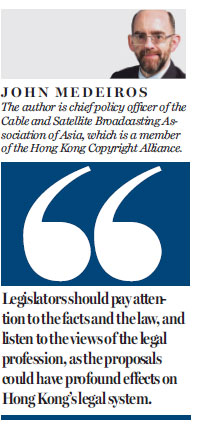Real purpose of the Copyright (Amendment) Bill being overlooked
Updated: 2015-12-18 09:31
By John Medeiros(HK Edition)
|
|||||||
The proposed amendments to the Copyright Ordinance are the subject of considerable public debate. After all the noise, the public have lost sight of the key purpose of the bill - it is not mainly about individuals' online activities; it is about combating organized, multinational crime syndicates which promote online infringement activities that the current Copyright Ordinance cannot cover.
As a concrete example, I would point to recent court cases in the US, in which Chinese content producers (CCTV and TVB) have obtained injunctions against the so-called "TVPad" streaming box syndicate, which did massive damage to Asian content producers by stealing their US markets. No such action is possible in Hong Kong until the Copyright Amendments are passed. This is why further delay in passing the bill is unacceptable - creators need relief from organized, cynical, commercial-scale piracy.
First introduced in 2011, the amendments have been broadened to afford major new protections for free speech and expression. The legal sector and scholars are unanimous that the revised bill provides some of the most extensive free speech exceptions in copyright law anywhere. In Hong Kong, Senior Counsel Winnie Tam, the current Bar Association chairwoman, commented that "the bill contains some of the broadest copyright exceptions in the world the exception for commenting on current affairs is unique to Hong Kong." Yet the scare tactics of some so-called "netizen" groups, backed by Internet companies which profit from any Web traffic, legal or illegal, continue to deceive citizens that the bill is a threat to their liberties.
With respect to the three amendments:
User-generated content (UGC):
A blanket exception for UGC is unwarranted because the hard work of the employees in the creative sector is easily stolen and spread online under the fictitious guise of being "user-generated". A blanket exception would allow anyone to say, "Oh, I have copied this video of Game of Thrones and provided my own commentary at the end, so it is covered by the exception." It should be obvious that not all content uploaded online is legitimate, and not all should be covered by a blanket exception. Whether the motivation of the uploader is commercial or not, the content owner can be badly damaged by "free sharing".
Among other countries, only Canada has adopted a similar exception, and many academics have said that it does not meet treaty standards for copyright exceptions. A World Trade Organization trade case against UGC exceptions is still very possible.
Fair use:
A "fair use" exception system is used in only a tiny number of countries, the most prominent of which is the US. The "fair use" doctrine provides for open-ended exceptions, whose scope is not defined in the law. The US "fair use" system is grounded in litigation developed over 150 years of case law. Hong Kong's legal system is based on UK frameworks and precedents, and not those in the US.
Introducing "fair use" in Hong Kong has been studied at various times by the government, which has concluded that adopting this system would introduce huge uncertainty for users as well as copyright owners, and levy large adjustment burdens on Hong Kong. There would be no clear rules; especially at the beginning, every case would have to be adjudicated by a court to see if the use is fair. Even in the US, commentators observe that "it is exceedingly difficult to predict whether a given use in a given case will qualify for the privilege". Without the backing of US case law, adopting "fair use" would be a huge leap in the dark. That said, the creative sector does not oppose another systematic and careful look at potential improvements; but such a move cannot be taken hurriedly. The law should not be treated lightly. We support the government's intention to examine this question next year, after the current amendments are passed.
Contract override:
This is a very new issue; a contract override provision was adopted in the UK last year amid much controversy and the UK the only jurisdiction that has introduced it. The UK provision is on trial for five years and will need to be reviewed. For the most part, this measure would affect relationships among producers of content, and would not affect consumers. It is frankly quite unclear why Hong Kong advocates for this provision see it as significant for Hong Kong users and why they wish to hurriedly embrace a provision only under test in the UK. Time should be taken to examine this concept more closely.
In sum, there are many serious deficiencies in these three amendments. Legislators should pay attention to the facts and the law, and listen to the views of the legal profession, as the proposals could have profound effects on Hong Kong's legal system. I can only speak for the television industry, but for us the amendments are unacceptable. They would create huge loopholes in copyright protection - so huge that the bill will have no value for us if the amendments are included. They should be rejected, and the "clean" legislation passed as soon as possible.

(HK Edition 12/18/2015 page10)